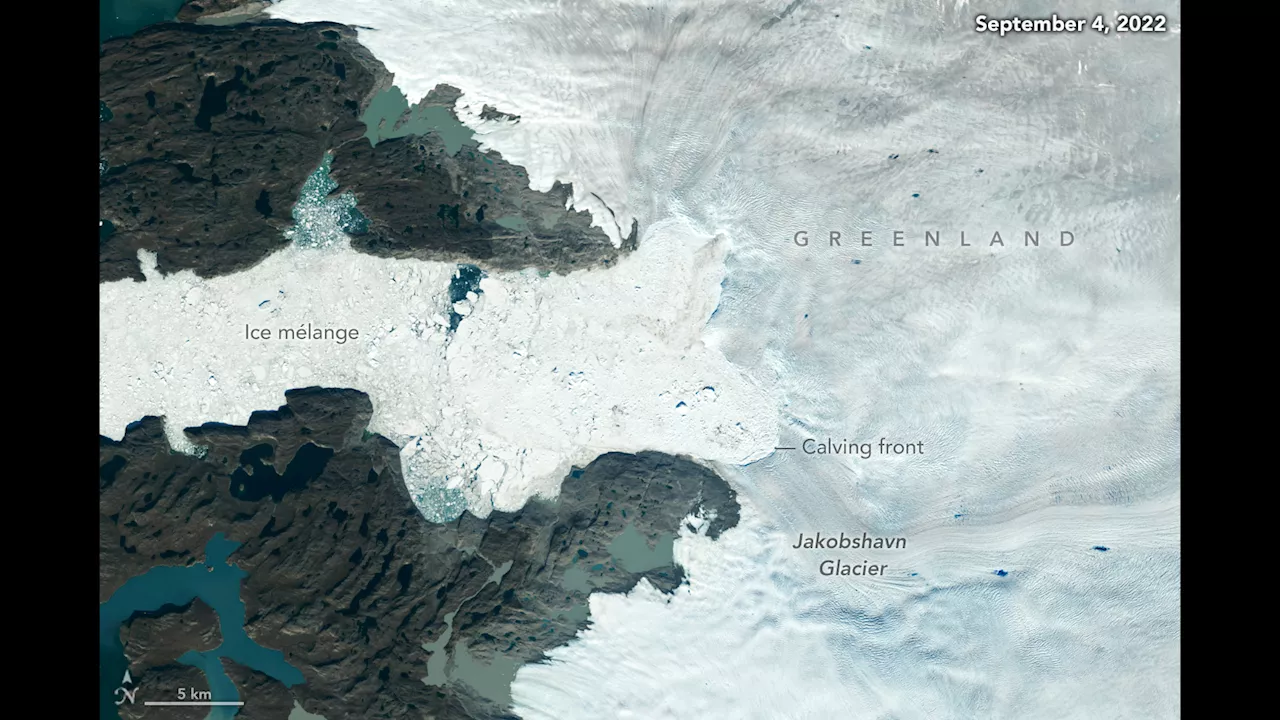A new, comprehensive analysis of satellite data finds that majority of glaciers on the landmass have retreated significantly.
4 min readJakobshavn Isbrae, a glacier on Greenland’s western coast, is shown in imagery taken on Sept. 5, 1985, by the Landsat 5 satellite. Jakobshavn receded from 1985 to 2022, losing about 97 billion tons of ice, a recent study of the Greenland Ice Sheet’s glacial retreat found.A Landsat 8 image from Sept. 4, 2022, shows Jakobshavn Isbrae breaking at its edge.
“When the ice at the end of a glacier calves and retreats, it’s like pulling the plug out of the fjord, which lets ice drain into the ocean faster,” said Chad Greene, a glacier scientist at JPL and the study’s lead author.For decades researchers have studied the Greenland Ice Sheet’s direct contributions to global sea level rise through ice flow and melting.
The researchers also found that Greenland’s ice extent remained relatively steady from 1985 to 2000, then started a marked recession that continues to this day.
United States Latest News, United States Headlines
Similar News:You can also read news stories similar to this one that we have collected from other news sources.
 NASA's Launches Mission to Study Earth's 'Invisible Universe'Science and Technology News and Videos
NASA's Launches Mission to Study Earth's 'Invisible Universe'Science and Technology News and Videos
Read more »
 NASA Launches a New Mission to Study the Effects of Climate ChangeSpace and astronomy news
NASA Launches a New Mission to Study the Effects of Climate ChangeSpace and astronomy news
Read more »
 Traumatic Brain Injury Linked to Cardiovascular Disease, Study FindsA study has found a surprising connection between traumatic brain injury (TBI) and cardiovascular disease (CVD). Individuals with TBI are at an elevated risk of unfavorable cardiovascular outcomes for an extended period following the initial incident. Regular monitoring and implementing strategies to mitigate cardiovascular disease risk are crucial for healthcare practitioners.
Traumatic Brain Injury Linked to Cardiovascular Disease, Study FindsA study has found a surprising connection between traumatic brain injury (TBI) and cardiovascular disease (CVD). Individuals with TBI are at an elevated risk of unfavorable cardiovascular outcomes for an extended period following the initial incident. Regular monitoring and implementing strategies to mitigate cardiovascular disease risk are crucial for healthcare practitioners.
Read more »
 OTC Topical Scar Products May Contain Allergens, Study FindsOf the 156 products identified, most were gels, creams, or oils.
OTC Topical Scar Products May Contain Allergens, Study FindsOf the 156 products identified, most were gels, creams, or oils.
Read more »
 100% fruit juice associated with weight gain in children and adults, study findsDrinking a glass or more of 100% fruit juice daily is associated with a small weight gain in children and adults, according to a new analysis.
100% fruit juice associated with weight gain in children and adults, study findsDrinking a glass or more of 100% fruit juice daily is associated with a small weight gain in children and adults, according to a new analysis.
Read more »
